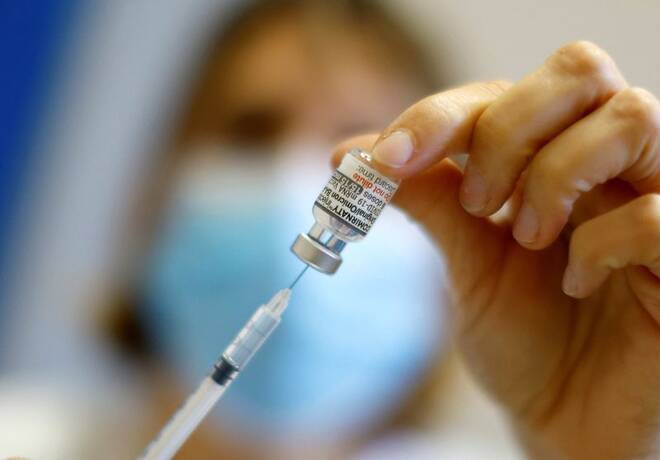Advertisement
Advertisement
Exclusive-EU may pay more for Pfizer COVID shots in return for lower volume
By:
By Maggie Fick (Reuters) - Brussels is discussing with Pfizer and BioNTech the possibility of reducing the up to 500 million COVID-19 vaccine doses the EU has committed to buy this year in return for a higher price, a source with knowledge of the talks said.
By Maggie Fick
(Reuters) – Brussels is discussing with Pfizer and BioNTech the possibility of reducing the up to 500 million COVID-19 vaccine doses the EU has committed to buy this year in return for a higher price, a source with knowledge of the talks said.
Also on the table is an extension of the deadline for delivery, possibly to the second half of 2024, the source said. They declined to be identified because the talks are confidential.
The negotiations are ongoing, and it is not clear what the final outcome may be.
The talks come amid of global glut of COVID-19 shots, and relate to the biggest contract for vaccines of all those signed by the EU while the pandemic raged.
A European Commission spokesperson asked for comment on the talks called on vaccine makers to work with member states and the Commission “to ensure that the agreements reflect the changing situation”.
The Commission “will continue in view of adapting the supply of vaccine doses over the years to come, and to extend it over a larger time period”, the spokesperson said, declining to comment on pricing or other details.
A Pfizer spokesperson declined to comment on details of the discussions, but said the company has shown ongoing commitment to accommodating EU member state concerns.
With regards to price, the Pfizer spokesperson said: “We have always had a tiered pricing approach for the COVID-19 vaccine, guided by agreed volumes and national income tiers, to ensure equity between agreements with countries with similar economic profiles.”
A BioNTech spokesperson added that their company “continue(s) to work with the European Commission and governments to find pragmatic solutions while respecting the fundamental principles agreed between the parties in concluding the agreement”.
Global glut
Though the glut of vaccine is an issue worldwide, Europe is contending with a particularly big excess.
Most people in the EU who wanted a primary course of the COVID-19 vaccine, and those who were later eligible for boosters, have received them. The EU’s drug regulator cautioned in November that uptake of booster doses had been disappointing.
In May 2021, Brussels signed a contract with Pfizer and BioNTech to buy 900 million doses, with an option for an additional 900 million doses, by the end of 2023.
Around half or more of the first 900 million doses from that contract have not yet been delivered because demand dropped last year. The EU has not exercised the additional option.
Some 328 million people in the EU out of a total population of around 450 million have received the primary course of a vaccine, according to Our World in Data.
The talks over the unwanted doses are the latest in a series of negotiations over changes to the 2021 contract. Brussels is under pressure to cut the volume as EU member states complain of strained budgets and no desire to spend money on unneeded doses.
At 19.50 euros ($21.22) in the May 2021 contract, the amount that European governments are contractually obliged to pay this year totals between 7.8 billion and 9.75 billion euros.
It is unclear what the renegotiated price in Europe would be. In the United States, Pfizer is hoping to charge a list price of $110 to $130 per dose in the fall, though that price does not include discounts.
EU officials have said for months that there is a mismatch between supply and demand of COVID-19 vaccines.
“We are no longer at the peak of the crisis, and this directly impacts our demand for vaccines, while public finances are under great strain at this moment,” EU Health Commissioner Stella Kyriakides told a European Council meeting in December.
“Our vaccine contracts need to take the current situation into account, and companies should show flexibility on that,” she added.
Last summer, the two sides agreed to pause deliveries to give EU countries time to administer what they had received. That came after EU governments warned Pfizer and other companies that millions of doses could go to waste.
In November, they signed an amendment that gave countries the ability to have doses delivered and stored in warehouses, another sign of the supply glut.
($1 = 0.9184 euros)
(Reporting by Maggie Fick; Additional reporting by Michael Erman in New York and Patricia Weiss in Frankfurt; Editing by Josephine Mason and Jan Harvey)
About the Author
Reuterscontributor
Reuters, the news and media division of Thomson Reuters, is the world’s largest international multimedia news provider reaching more than one billion people every day. Reuters provides trusted business, financial, national, and international news to professionals via Thomson Reuters desktops, the world's media organizations, and directly to consumers at Reuters.com and via Reuters TV. Learn more about Thomson Reuters products:
Did you find this article useful?
Latest news and analysis
Advertisement
